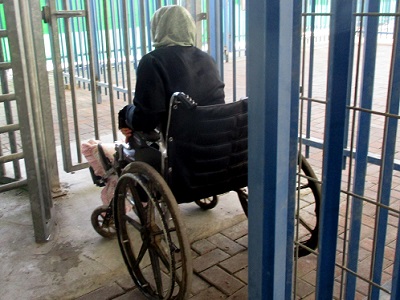
By Tamar Fleishman
(Translated by Tal Haran)
The ill girl in the wheelchair arrived, only to face a locked gate at the end of the track with a twisted, ragged Orwellian sign indicated its ‘humanitarian’ function.
Her father was there to care for her. “She cannot stand on her feet” he said. He was taking his daughter from a hospital in Jenin, in the northern West Bank to al-Muqassad Hospital in East Jerusalem in order to undergo surgery in her pelvic bones.
A woman soldier was there, too, behind the fence inside the secured army post. She emerged for a moment and announced that a policeman would show up shortly and open the locked gate.
“How much time is ‘shortly?” I asked. “Five minutes”, she answered.
Those “five minutes” became a kind of mantra that was repeated so many times over such a long period of time, perhaps in order to appease us, who were waiting outside, so we’d stop bothering those inside – those who operate the checkpoint and are responsible, even according to the official document of the Israeli Coordinator of Government Activities in the Territories (COGAT) for prioritizing the passage of ill patients.
“Another five minutes” repeated a military policeman who arrived with a bunch of keys in one hand and a TV dinner for the woman soldier in the other.
The same “another five minutes” were promised by Nathaniel from the humanitarian hotline. He told me on the phone, time and again.
I told Nathaniel that here, at the Qalandiya Checkpoint there is a sick patient in a wheelchair who had arrived with her father from Jenin and that they have been en route for four hours and cannot continue because the gate is locked and there is no one on site to open it.
He responded: “Is she Arab?”
We waited and waited and the gate remained locked. Five minutes and another five minutes and another, and an hour, and another hour-and-a-half, and even longer. And inside, between the metal partitions, a boy tired and leapt over the bars and yelled at the woman soldier.
Less than five minutes later, a large armed army unit arrived, surrounded the boy, dragged him from his neck somewhere unknown.
Meanwhile, the ill girl sat silent and curled up in her wheelchair.
As the day dissipated, there was no sign that anyone inside the secured room cared about here. The father, who shook the fence opposite the woman soldier in vain, trying to get her attention, was hoping that perhaps she would be their salvation, and when that didn’t work, he said: “I should have carried her on my back and not relied on their mercy.”
But even the ‘five minutes’ come to an end, hours later. A policeman arrived and opened the gate, for the ill girl and the desperate father.
Tragic as their situation was, one can only hope that the girl’s surgery will succeed, and that the girl would one day heal so that she could stand on her own feet.
– As a member of Machsomwatch, once a week Tamar Fleishman heads out to document the checkpoints between Jerusalem and Ramallah. This documentation (reports, photos and videos) can be found on the organization’s site: www.machsomwatch.org. She is also a member of the Coalition of Women for Peace and volunteer in Breaking the Silence. She contributed this article to PalestineChronicle.com.




